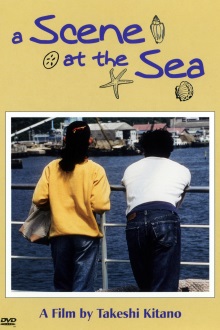
Takeshi Kitano is a Japanese filmmaker of some renown but I believe this is one of his more obscure works. I would never have chosen to watch if it had not been a personal recommendation from our cinephile friend. I understand that it’s quite a break from a director who is famous for his gangster films and even looks the part. It’s certainly a rather unique film and I’m not quite sure what to make of it.
Shigeru is a young garbage collector who is deaf and dumb. One day while picking up trash bags with his partner he notices a broken surfboard and becomes obsessed with taking up the sport. He takes the board, repairs it with a piece of styrofoam and goes to the beach with his equally silent girlfriend Takako to learn to surf. At first he is awful at it but his persistence impresses the other regular surfers, especially as he is too poor to afford a wetsuit. When his jury-rigged board snaps, he needs to save enough money to buy a new one but then goes straight back to practising, accompanied always by the supportive Takako. The owner of a local surfing supplies shop at first appears unrepentant about selling him a board at a higher than usual price but relents when he sees his determination, gifting him with a wetsuit and encouraging him to join local competitions. Eventually his skill at surfing improves and despite never saying a word, he becomes friends with the other local surfers.
The plot is so straightforward and simple that one can’t help but question if this is really all there is and the truth is it really is so simple. It distinguishes itself by not only having very minimal dialogue but also by how the main characters all have very deadpan faces with almost no emoting. The story is pretty much conveyed entirely through body language and context, making it a remarkable exercise in visual storytelling. Despite or perhaps because of the minimalism, the film works fairly well too in the very restrained and reserved manner that some Japanese seem to favor. It captures Shigeru’s determination and eventual success without a hint of sentimentalism, is sweetly romantic about Shigeru and Takako’s relationship without a word of dialogue passed between them nor any physical affection beyond an arm draped around a shoulder and even has a bit of humor in the form of two bumbling characters who decide to take up surfing themselves in Shigeru’s footsteps. It’s not a film about powerful emotions but its slow and deliberate pace makes it a very pleasant and reassuring experience to watch.
At the same time there are aspects of the film that, while being very Japanese, I’m less comfortable with. Takako is the very picture of the stereotypical subservient girlfriend who quietly follows Shigeru around wherever he goes and supports him without actually engaging in any activities herself. The effect is intended to be sweet but it makes me rather uneasy. I also find myself disliking the ending which feels like a lazy way to add a touch of bittersweetness into the film. I do realize that it’s meant to fit in with the film’s Japanese theme of mono no aware, that all things are transient and we should be conscious of it. It works fine with the frequent shots of the characters doing nothing but stare out at the sea as they are living the moment. The ending however feels needlessly jarring for the purpose of giving the film a conclusive ending when simply allowing to peter out would work fine I think.
Overall I found myself enjoying this as a sort of undemanding, slow burn experience. I keep being surprised by how straightforward and uncomplicated it is, which is kind of refreshing. I do however doubt that I will remember it many years later.
One thought on “A Scene at the Sea (1991)”